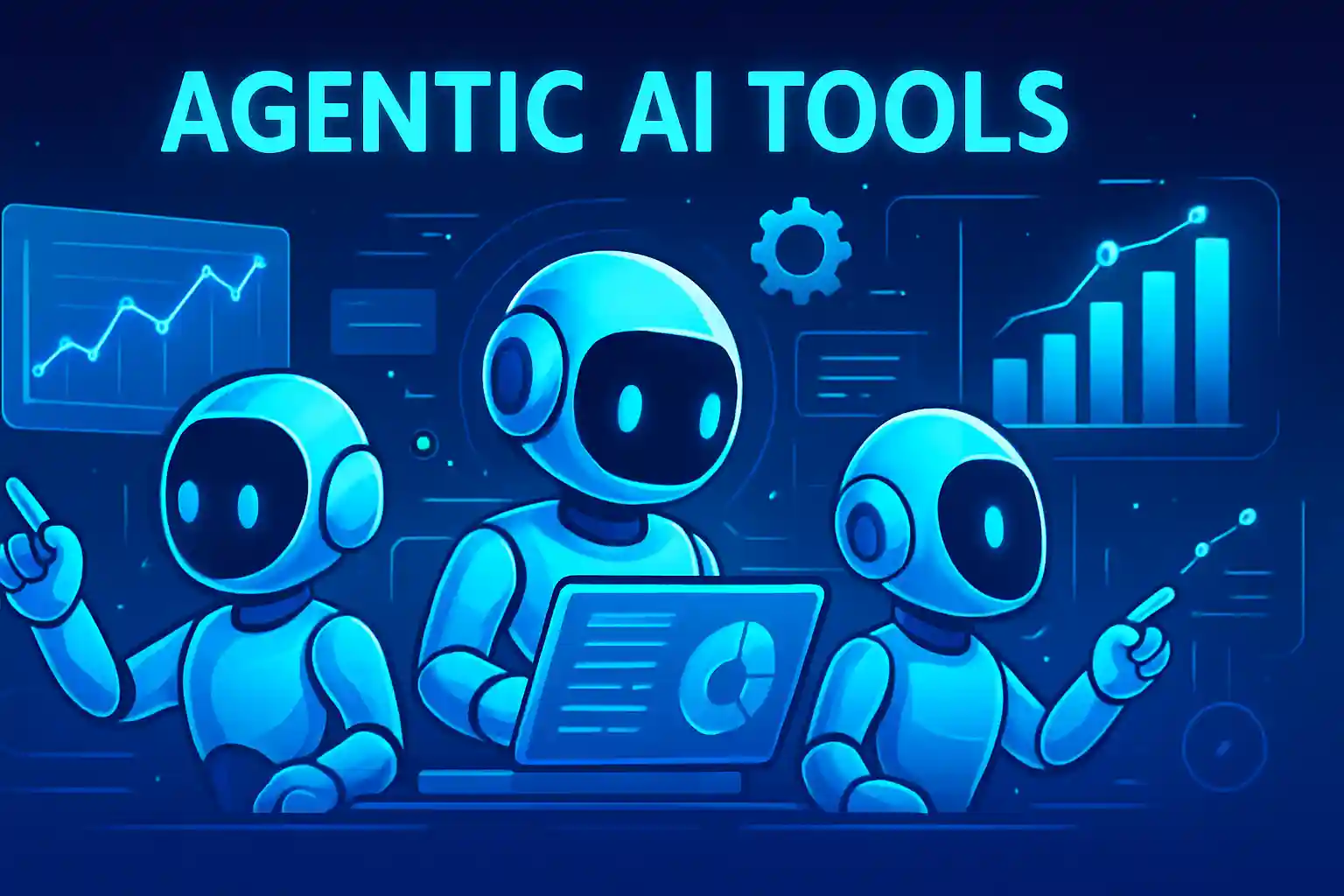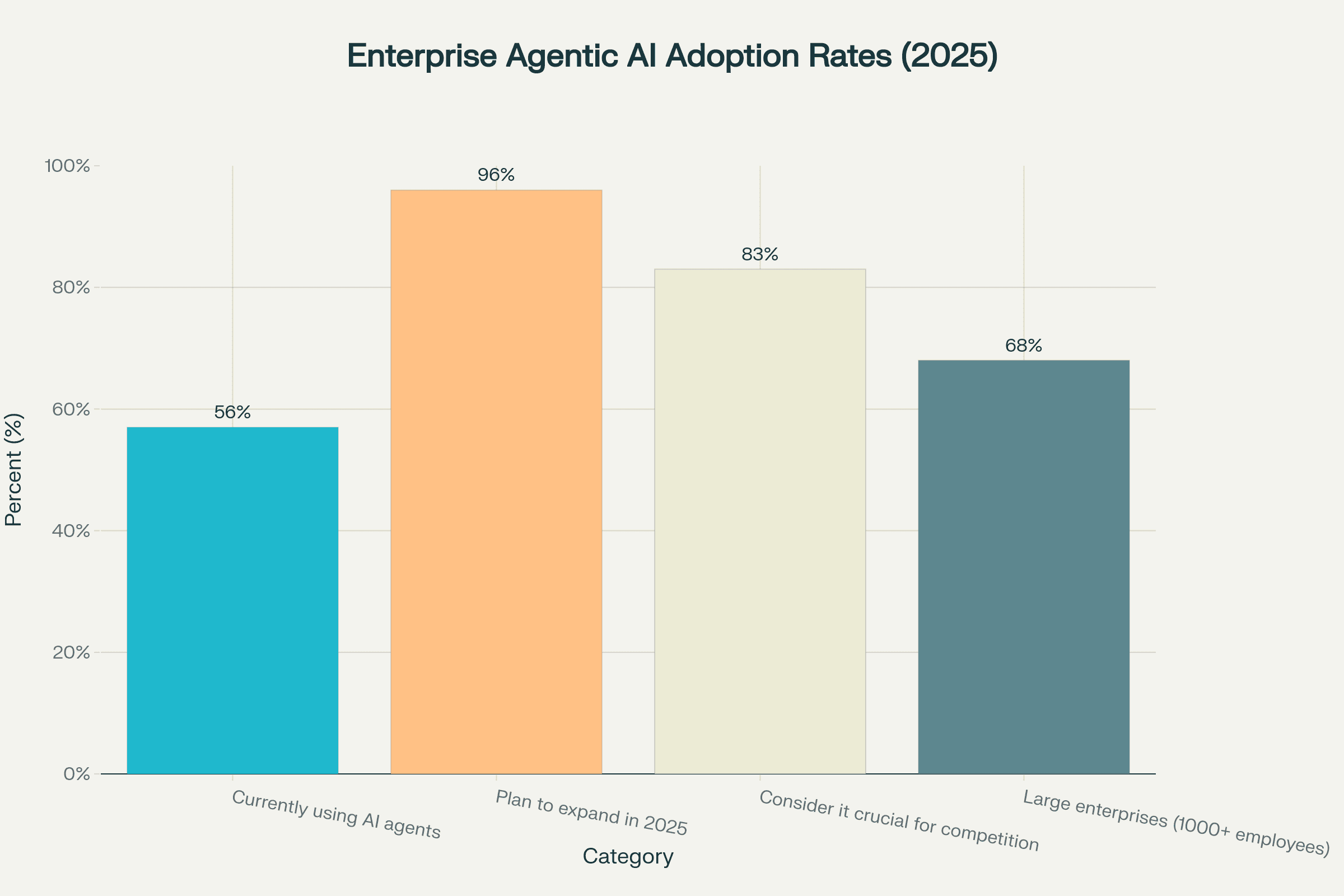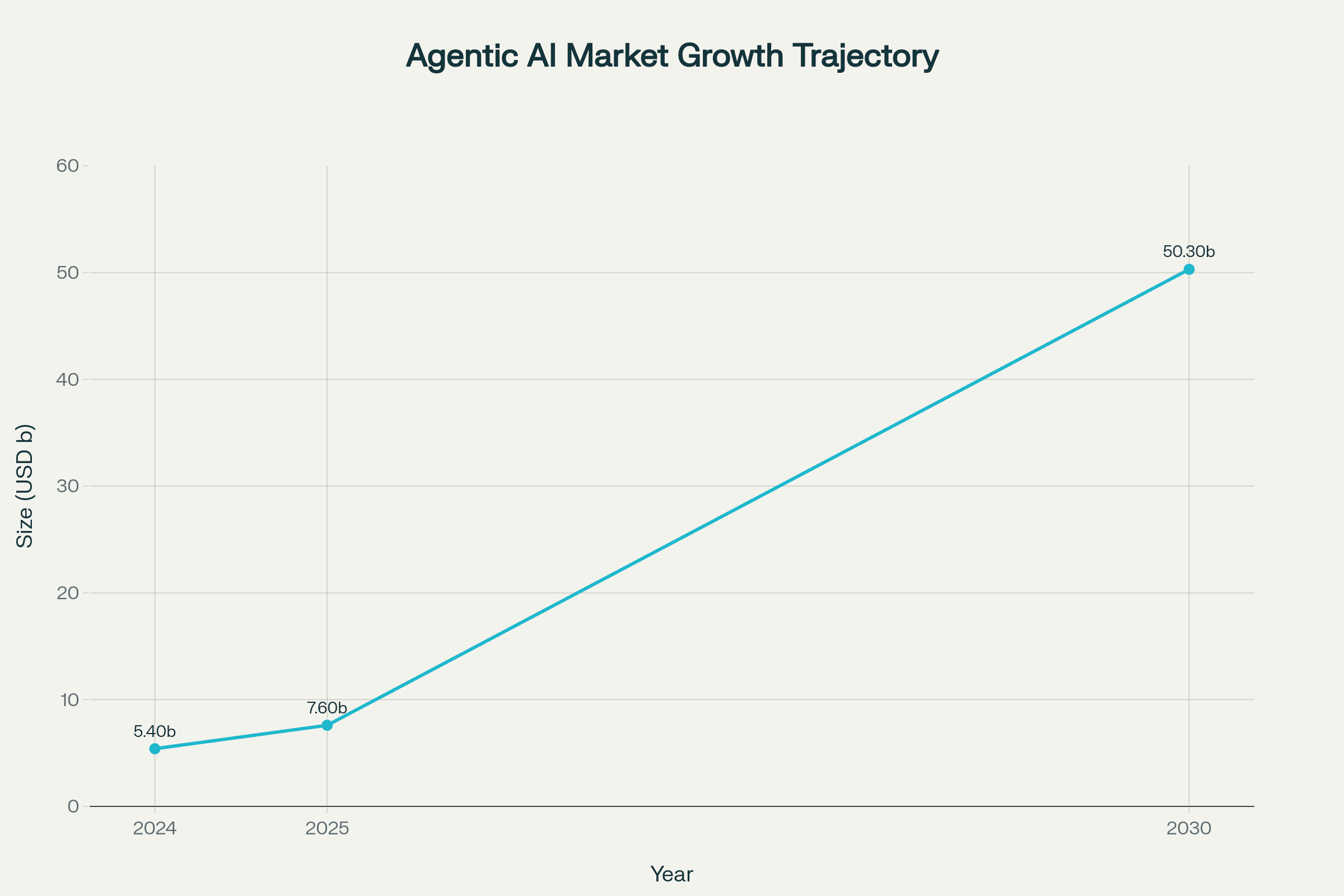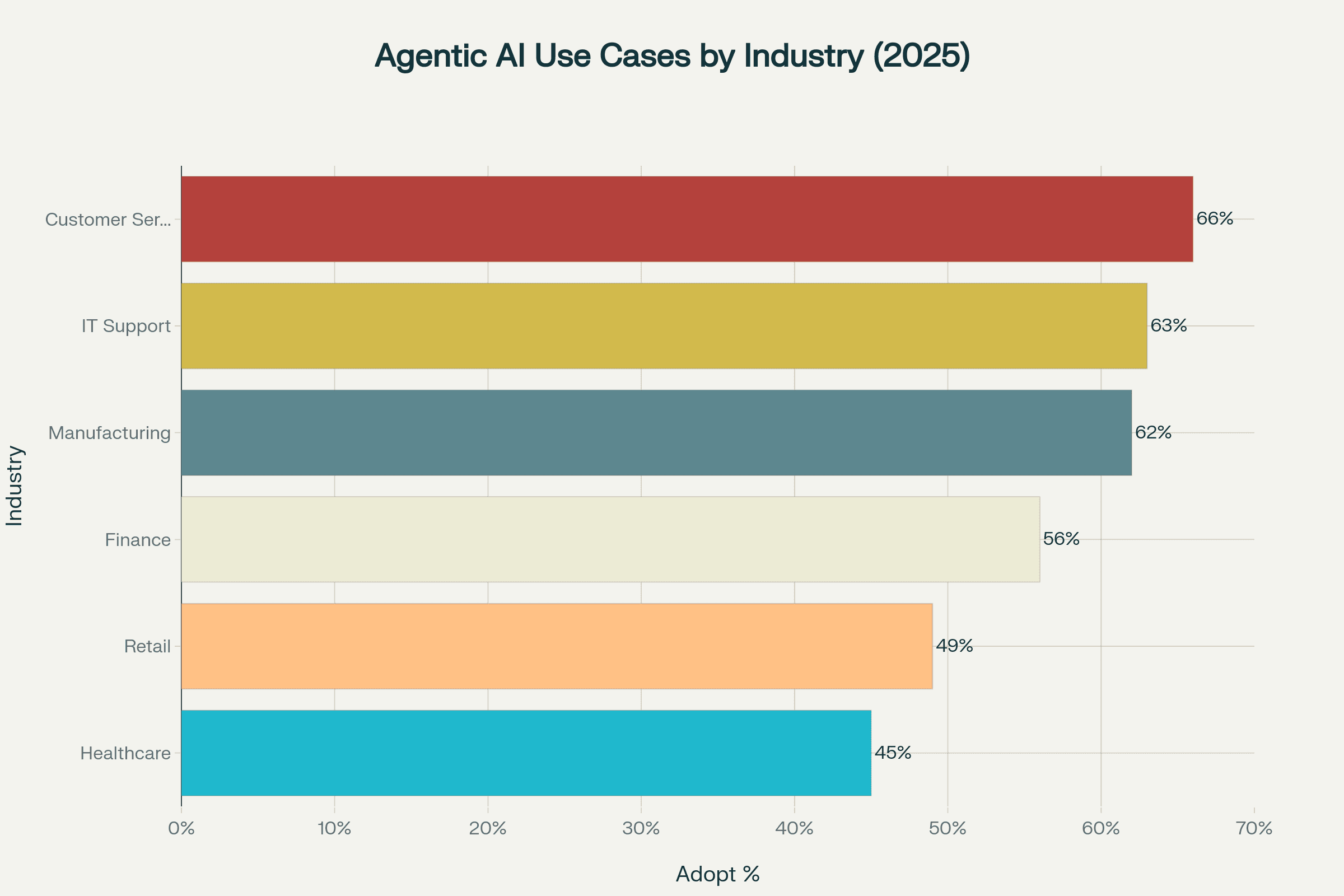
Sarthak Tyagi
Web Developer | AWS Cloud Architect

Discover the revolutionary world of agentic AI tools and their game-changing use cases across industries. Learn about market growth, top platforms like CrewAI and Agentforce, and real-world applications transforming customer service, finance, healthcare, and manufacturing. Explore how autonomous AI agents are delivering 25-40% efficiency gains and reshaping the future of work.
Think of agentic AI as the evolution from having a helpful assistant to having a smart colleague who can work independently. Unlike traditional AI that waits for your prompts and gives you answers, agentic AI systems can set their own goals, make decisions, and take actions to achieve specific outcomes.
These aren't your typical chatbots or voice assistants. Agentic AI tools are autonomous systems that can perceive their environment, analyze data, make decisions, and act independently to achieve specific goals. They combine advanced capabilities like machine learning, natural language processing, and decision-making algorithms to operate with minimal human intervention.
The key difference? Traditional AI is reactive—it responds to what you ask. Agentic AI is proactive—it can plan ahead, adapt to new situations, and even collaborate with other AI systems to get things done. It's like having a digital teammate that never sleeps and continuously learns from experience.
Here's where things get really interesting. The agentic AI market is experiencing unprecedented growth that's making even seasoned tech analysts take notice. According to multiple research sources, we're looking at a market that was valued at around $5.4 billion in 2024 and is projected to reach over $50 billion by 2030.

Enterprise Agentic AI Adoption Rates showing 96% of enterprises plan to expand AI agent usage in 2025
The numbers are staggering. Different research firms are reporting compound annual growth rates (CAGR) ranging from 39% to 46%, with some sources predicting the market could reach as high as $236 billion by 2034. This isn't just hype—it's backed by real enterprise adoption and tangible business results.
What's driving this explosive growth? Companies are realizing that agentic AI can deliver 25-40% efficiency gains in automated workflows. Some enterprises are even reporting 10 to 100x productivity improvements. When you can automate complex, multi-step processes that previously required human oversight, the return on investment becomes impossible to ignore.

Agentic AI market growth trajectory showing exponential growth from $5.4B in 2024 to $50.3B by 2030
Let's talk about what's really happening in the enterprise world. The adoption rates for agentic AI are nothing short of remarkable. According to Cloudera's comprehensive survey of 1,484 enterprise IT leaders across 14 countries, 96% of organizations plan to expand their use of AI agents in the next 12 months.
But here's what's even more impressive: 57% of companies have already implemented AI agents in just the past two years, with 21% starting within the last year alone. Among large enterprises with over 1,000 employees, adoption rates have jumped to 68%. These aren't pilot programs anymore—they're strategic implementations that are transforming how businesses operate.
The investment priorities are clear. Organizations are focusing on performance optimization bots (66%), security monitoring agents (63%), and development assistants (62%). These aren't just nice-to-have tools; 83% of executives consider investing in agentic AI essential to remain competitive.
Now, let's get into the tools that are making this transformation possible. The landscape is diverse, with options ranging from open-source frameworks to enterprise-grade platforms.
CrewAI stands out as a framework designed for real-time collaboration between multiple AI agents. It's built with a Pythonic approach, making it intuitive for developers who want to orchestrate complex multi-agent systems. The platform excels at coordinating teams of AI agents working together to solve complex problems.
AutoGen, developed by Microsoft Research, enables the creation of sophisticated AI workflows through multi-agent conversations. It's particularly strong for software development, data analysis, and research applications where you need AI agents to collaborate and build on each other's work.
LangChain has become a go-to framework for building AI applications with contextual memory and data retrieval capabilities. While not purely an agent platform, it provides the building blocks for creating custom agents that can chain together complex operations.
Agentforce from Salesforce represents the enterprise approach to agentic AI, integrating deeply with CRM systems and providing pre-built solutions for sales, service, marketing, and commerce functions. Companies like The Adecco Group and OpenTable are using it to provide faster, more personalized customer responses.
Microsoft Copilot Studio offers a comprehensive platform for building AI assistants that integrate seamlessly with Microsoft 365 applications. The low-code approach means business users can create custom agents without extensive programming knowledge, and companies like ICG have reported $500,000 in cost savings with 20% margin improvements.
OpenAI's Operator is the newest player in the enterprise space, representing what many consider the most advanced AI agent platform available. Starting at $199 per month, it's designed for businesses that need GPT-powered automation with extensive API capabilities.
The beauty of agentic AI lies in its versatility. Let's explore how different industries are leveraging these tools to solve real problems and create value.
Customer service is leading the charge with 66% adoption rates. AI agents are handling millions of inquiries daily, providing 24/7 support that can understand context, resolve issues, and even anticipate customer needs. Unlike traditional chatbots that follow scripts, these agents can analyze customer history, understand complex problems, and provide personalized solutions.
Companies like Discover Financial have created AI-powered virtual assistants that can help customers directly while also providing additional information to human service agents. The result? Smoother, more efficient interactions that improve customer satisfaction while reducing operational costs.
The financial sector is experiencing what the World Economic Forum calls a "transformative era" for agentic AI. Banks and financial institutions are using AI agents for fraud detection, risk assessment, and automated trading. JPMorgan Chase has reduced fraud by over 30% using AI systems that analyze transaction patterns in real-time.
In wealth management, platforms like Wealthfront are using AI agents to provide personalized investment strategies based on individual goals and risk tolerance. These agents can monitor market conditions, adjust portfolios, and provide financial advice around the clock.
Healthcare organizations are implementing AI agents to enhance patient care and streamline operations. AI-powered diagnosis systems can analyze medical data to detect diseases and suggest treatments. Remote patient monitoring agents track vital signs and alert healthcare providers about anomalies, enabling proactive care.
Companies like Elanco have implemented agentic AI frameworks that support critical business processes, resulting in an estimated ROI of $1.9 million since launching. In clinical settings, AI agents are assisting with appointment scheduling, medication reminders, and patient education.

Industry-specific use cases for agentic AI showing customer service leading with 66% adoption rate
Manufacturing companies are using agentic AI for predictive maintenance, quality control, and supply chain optimization. AI agents can predict equipment failures before they occur, reducing downtime and maintenance costs. Amazon uses robotic agents in warehouses to optimize inventory management and reduce the need for human workers to travel long distances.
In supply chain management, AI agents analyze vast amounts of data to forecast demand, optimize inventory levels, and identify potential disruptions. This allows companies to adjust their strategies in real-time, reducing waste and ensuring products are available when and where needed.
Retail businesses are leveraging AI agents for personalized shopping experiences, inventory management, and dynamic pricing. AI-driven recommendation engines analyze customer behavior to suggest products, while chatbots provide instant customer support. These agents can handle everything from product inquiries to order tracking and returns processing.
IT departments are seeing significant benefits from agentic AI, with 63% adoption rates for security monitoring agents. AI agents can monitor networks for threats, automatically respond to security incidents, and even perform routine maintenance tasks. In software development, agents are helping with code reviews, bug detection, and automated testing.
Understanding how agentic AI works helps explain why it's so powerful. These systems rely on four key components that work together seamlessly:
Perception: AI agents collect input from various sources—users, sensors, databases, APIs, and external systems. They can process multimodal inputs including text, images, audio, and video, giving them a comprehensive understanding of their environment.
Decision-Making: Using advanced algorithms and large language models, agents analyze the collected data to determine the best course of action. They can process complex scenarios, weigh multiple factors, and make informed decisions based on their training and experience.
Action: Once a decision is made, agents can execute actions through system updates, API calls, tool usage, or direct outputs. They can interact with multiple systems simultaneously and coordinate complex workflows.
Learning: Perhaps most importantly, agents improve over time based on feedback and outcomes. They build memory from past interactions and use this experience to make better decisions in future situations.
This combination of capabilities enables agentic AI to handle complex, multi-step tasks that would traditionally require human oversight and intervention.
Let's dive deeper into how different sectors are implementing agentic AI to solve specific challenges and create competitive advantages.
Financial institutions are at the forefront of agentic AI adoption, driven by the need for real-time decision-making and risk management. Beyond fraud detection, banks are using AI agents for:
Automated Financial Advisory: AI agents provide personalized investment advice by analyzing market conditions, individual risk profiles, and financial goals. They can rebalance portfolios, suggest investment opportunities, and even execute trades based on predetermined criteria.
Loan Processing: AI agents streamline the loan application process by automatically analyzing creditworthiness, verifying documents, and making approval decisions. This reduces processing time from days to minutes while maintaining accuracy.
Compliance Monitoring: Financial institutions use AI agents to continuously monitor transactions and communications for regulatory compliance, automatically flagging potential issues and generating required reports.
Healthcare organizations are implementing agentic AI to improve patient outcomes while reducing costs:
Clinical Decision Support: AI agents assist healthcare providers by analyzing patient data, medical literature, and treatment guidelines to suggest optimal care plans. They can identify potential drug interactions, recommend diagnostic tests, and flag unusual symptoms.
Administrative Automation: AI agents handle appointment scheduling, insurance verification, and billing processes, freeing up healthcare staff to focus on patient care.
Drug Discovery: Pharmaceutical companies use AI agents to analyze molecular structures, predict drug efficacy, and optimize clinical trial designs, significantly reducing the time and cost of bringing new medications to market.
Manufacturing companies are leveraging agentic AI to optimize production processes and supply chains:
Quality Control: AI agents continuously monitor production lines, using computer vision and sensor data to detect defects and anomalies in real-time. They can automatically adjust process parameters to maintain quality standards.
Predictive Maintenance: By analyzing equipment data, AI agents can predict when machines are likely to fail and schedule maintenance proactively, minimizing downtime and reducing repair costs.
Supply Chain Optimization: AI agents monitor global supply chains, predicting disruptions and automatically adjusting orders, inventory levels, and logistics to maintain optimal operations.
Retail businesses are using agentic AI to enhance customer experiences and optimize operations:
Dynamic Pricing: AI agents continuously analyze market conditions, competitor pricing, and demand patterns to optimize pricing strategies in real-time, maximizing revenue while remaining competitive.
Inventory Management: AI agents predict demand, optimize stock levels, and automate reordering processes, reducing carrying costs while ensuring product availability.
Customer Experience: AI agents provide personalized shopping experiences by analyzing customer behavior, preferences, and purchase history to recommend products and customize marketing messages.
While the benefits of agentic AI are substantial, organizations must also address several challenges to ensure successful implementation.
Data Privacy and Security: With AI agents processing vast amounts of sensitive data, organizations must implement robust security measures and comply with privacy regulations. This includes ensuring data encryption, access controls, and audit trails.
Integration Complexity: Integrating agentic AI with existing systems can be complex and time-consuming. Organizations need to carefully plan integration strategies and ensure that AI agents can work seamlessly with legacy systems.
Skills Gap: Implementing and managing agentic AI requires specialized skills that may not be available in-house. Organizations need to invest in training or hire new talent to support their AI initiatives.
Ethical Considerations: As AI agents become more autonomous, organizations must address ethical considerations around decision-making, bias, and accountability. This includes establishing governance frameworks and ensuring transparency in AI operations.
Reliability and Trust: While AI agents are highly capable, they're not infallible. Organizations need to implement monitoring and oversight mechanisms to ensure that agents are performing as expected and can intervene when necessary.
For organizations considering implementing agentic AI, the key is to start small and focus on specific use cases that can deliver measurable value. Here are some practical steps:
Identify High-Impact Use Cases: Look for processes that are repetitive, time-consuming, and require consistent decision-making. Customer service, data analysis, and routine administrative tasks are often good starting points.
Choose the Right Platform: Consider factors like your technical expertise, integration requirements, and budget. Open-source platforms like CrewAI or LangChain offer flexibility but require technical skills, while enterprise solutions like Agentforce or Copilot Studio provide more support but may be more expensive.
Start with Pilot Projects: Begin with small-scale implementations that can demonstrate value and build confidence. This allows you to learn and refine your approach before scaling up.
Invest in Training: Ensure your team has the skills needed to implement and manage agentic AI successfully. This may involve training existing staff or hiring new talent.
Plan for Integration: Consider how AI agents will integrate with your existing systems and processes. Plan for data connectivity, security requirements, and workflow changes.
Agentic AI tools represent a fundamental shift in how we think about automation and artificial intelligence. They're not just tools that help us work faster—they're digital colleagues that can think, plan, and act independently to achieve complex goals.
The market growth, enterprise adoption rates, and real-world success stories all point to one conclusion: agentic AI is not just a trend, it's the future of intelligent automation. Companies that embrace these tools now will have a significant advantage over those that wait.
Whether you're in customer service, finance, healthcare, manufacturing, or any other industry, there are agentic AI tools and use cases that can transform your operations. The question isn't whether you should adopt agentic AI—it's how quickly you can get started and what impact you can create.
The future is here, and it's more intelligent, more autonomous, and more capable than ever before. The only question is: are you ready to work alongside your new AI colleagues?